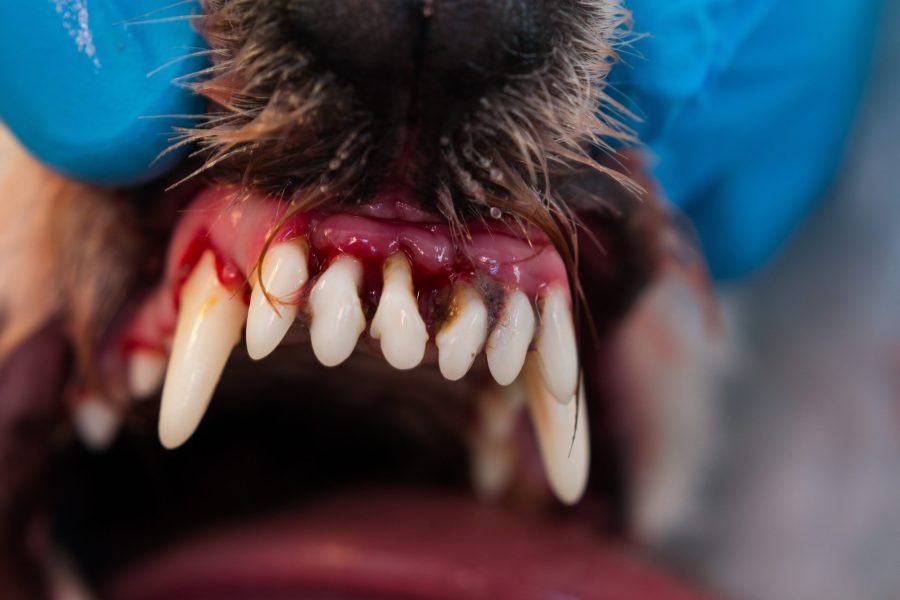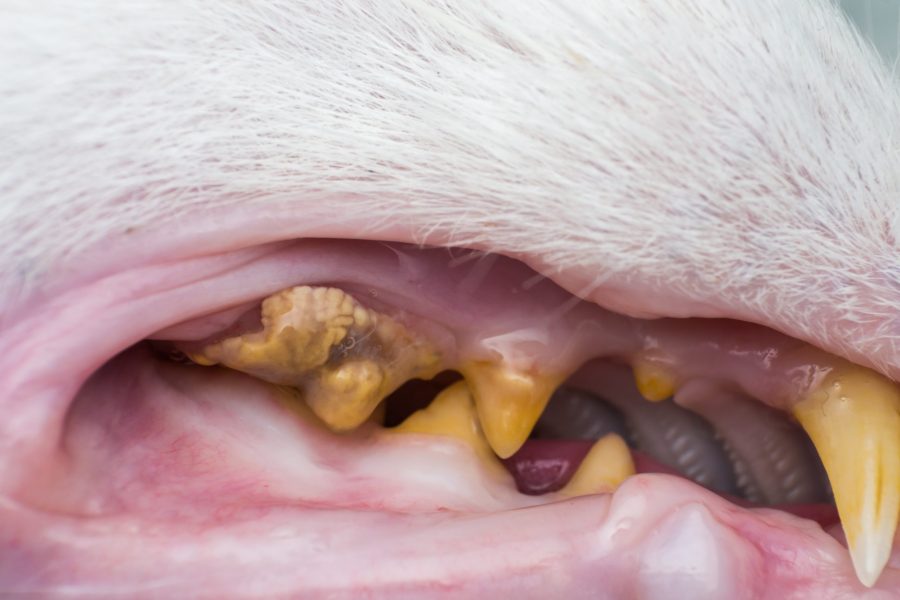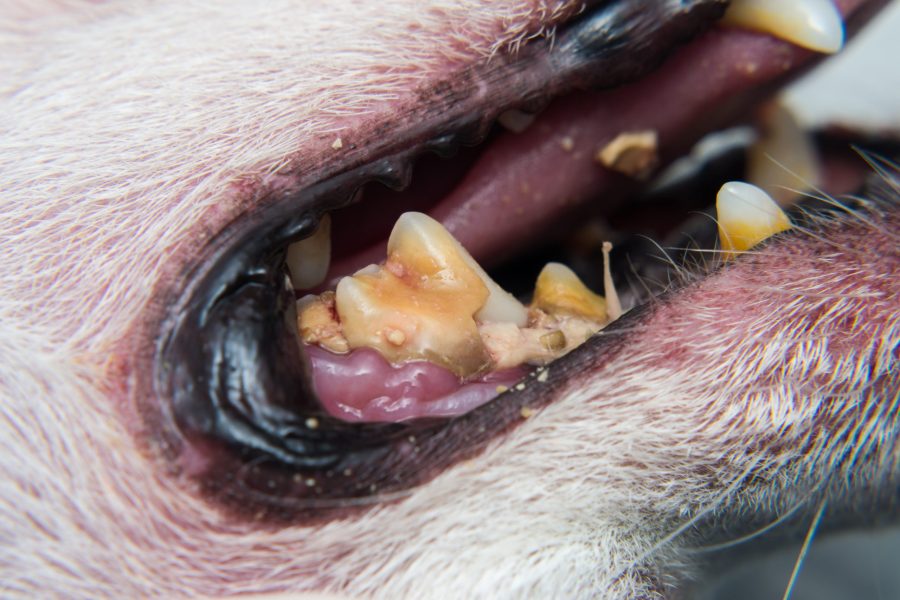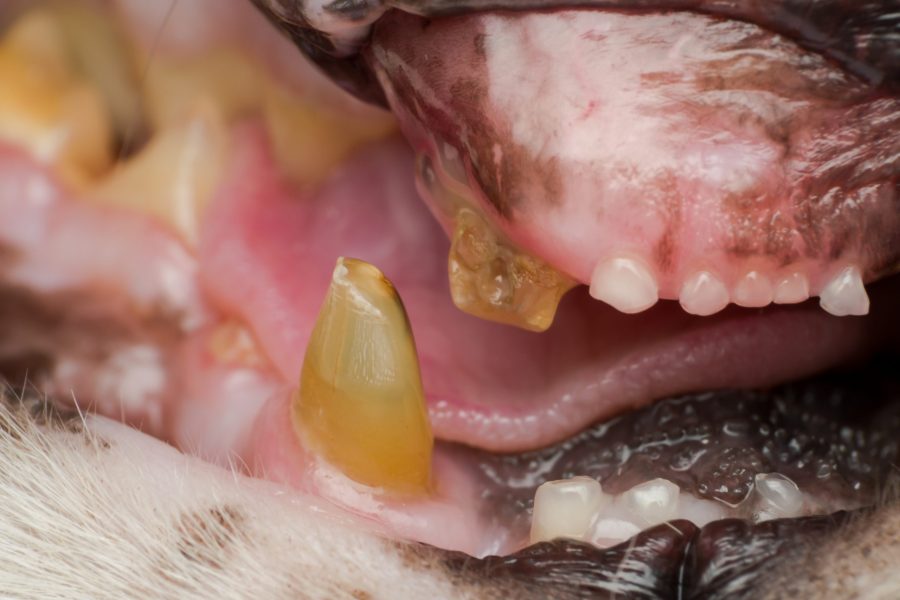Pet Tooth Infection

Periodontitis in dog

Pet Tooth Infections
Tooth infections in both cats and dogs can lead to more serious health issues if not treated promptly. Here's a short list of causes, symptoms, and remedies for tooth infections in cats and dogs.
Causes of Tooth Infections
Tooth infections are most commonly caused by poor oral hygiene, such as a lack of regular brushing. Periodontal disease is another common cause that occurs when bacteria build up around the gums and teeth, leading to an infection. Poor diet and genetics can also contribute to the development of mouth ailments.
Symptoms of Tooth Infections
Common symptoms of tooth infections in cats and dogs include bad breath, drooling, red or swollen gums, receding gum lines, tenderness around the mouth or jaw area, increased saliva production/drooling, and loss of teeth.
Remedies for Tooth Infections
It’s important to take your pet for regular checkups with their vet which may involve taking X-rays to detect any underlying issues. A professional cleaning may also be necessary to remove tartar buildup that cannot be removed with brushing alone. Your vet may also prescribe antibiotics or an antimicrobial rinse if an infection is present.
At home, care includes brushing your pet’s teeth regularly with a special toothbrush designed specifically for animals (not human toothbrushes). Special dental chews can also help keep your pet's teeth clean while providing entertainment during playtime! Additionally, try switching your pet's food to one specifically designed for good dental health or incorporating dental treats into their diet.
Common mouth ailments in dogs include dental tartar and plaque buildup, periodontal disease, gingivitis, tooth fractures or abscesses, and oral tumors. These conditions can cause bad breath, difficulty eating, and discomfort or pain in the mouth. Regular dental check-ups and at-home oral care can help prevent these issues.
Mouth Problems Are Tooth Problems
Most mouth ailments in dogs are directly related to their teeth. Common mouth ailments include periodontal disease, tooth loss, ulcers, and dental pain.
Periodontal disease is an infection of the gums caused by bacteria. Symptoms of periodontal disease include bad breath, drooling, inflamed or bleeding gums, and tooth loss. If left untreated, it can lead to more serious health issues such as organ damage and heart disease.
Tooth loss is another common ailment in dogs that can be caused by periodontal disease or trauma to the mouth. It can cause pain and difficulty eating if not treated promptly.
Mouth ulcers are sores that appear on the gums, lips, tongue, and inner cheeks of dogs. They are also known as mucositis and can be very painful for your pet if left untreated.
Dental pain is another common issue in dogs and can be caused by periodontal disease or fractured teeth. Symptoms of dental pain include tenderness when touched around the mouth or jaw area and bad breath.

cat teeth with tartar and gum retraction
Gingivitis vs Periodontitis
Gingivitis and periodontitis are both conditions that affect the gums, but they have different causes and treatments.
Gingivitis is an inflammation of the gums due to a buildup of plaque on the teeth. It can be caused by poor oral hygiene, such as not brushing and flossing regularly. Symptoms include redness, swelling, bad breath, and bleeding when touched or brushed. Gingivitis is treatable with proper oral hygiene and professional cleaning by a vet in most cases.
Periodontitis is more serious than gingivitis and occurs when bacteria build up around the gums and teeth resulting in infection. Poor diet, genetics, and living in a smoking environment can cause periodontitis. Symptoms may include receding gum line, loosening of teeth, or even tooth loss. Treatment typically includes antibiotics or antimicrobial rinses prescribed by a vet, while surgery may be necessary for chronic cases.
Gingivitis
Symptoms of gingivitis in dogs and cats can include:
- Bad breath
- Red, inflamed or swollen gums
- Bleeding when brushed or touched
- Loss of teeth
- Receding gum line
- Tenderness around the mouth or jaw area
- Increased saliva production/drooling
- Pigmented patches on the gums
It's important to keep an eye out for any signs of mouth ailments in your dog so you can get them treated quickly before they become more serious health problems. Regular brushing and dental checkups with your vet will help keep your pet's mouth healthy as well as prevent any further issues from developing down the road.

Tartar or bacterial plaque on dog

Dentition, fractured teeth and bacterial plaque